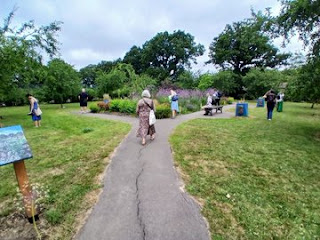St Paul’s letter to the Christians in Colossae begins with prayers for the church there and reminders of its story of faith and those who were significant in that story (Colossians 1.1-8). In his prayers for the Christians in Colossae, he says that he always thanks God for their faith in Christ Jesus and the love they have for all the saints. He reminds them of the hope laid up for them in heaven and of how they heard of this hope in the gospel that has come to them. Just as the Gospel is bearing fruit and growing in the whole world, so it has also been bearing fruit among them from the day you heard it and Epaphras, a beloved fellow-servant, has been a faithful minister of Christ on their behalf.
It is helpful and encouraging for us to look back to the story of faith in our church and Parish, as Paul encourages the Christians in Colossae to do here. Sometimes, when we look back, we can do so from a negative or deficit perspective lamenting what we feel we have lost in the present but which was present in the past. That isn’t what Paul is doing here. Instead, he is looking back in order that the Colossians see that God is working his purposes out in the present, just as did in the past.
Anniversaries can provide us with helpful moments to look back and celebrate God’s faithfulness and constancy in our lives and Parish. Last year, we celebrated the 90th anniversary of a church being opened on this site. Next year, we will celebrate the 250th anniversary of the opening of the current St Catherine’s Church. As we look back, let us give thanks, as St Paul did, for the faithfulness of God in bringing people to faith and, despite the challenges involved, sustaining Christian witness in this part of Essex.
Looking back also enables us to remember and give thanks for specific individuals, like Epaphras, who have been significant in our lives or in this Parish. Here, such people may include those who have a shared place in our lives and faith journey such as David Loman, who was a much-loved Rector in the Parish and who was also my Diocesan Director of Ordinands who sensitively and helpfully prepared me for selection and for ministry or Paul Trathen, a curate in the Parish when Philip Kearns was Rector, who is also a good friend of mine and someone I met during ordination training meaning we have accompanied each other through our respective ministries. I wonder who the people are in your past who have supported and encouraged you on your faith journey. Take a moment now to bring them to mind and give thanks to God for their ministry in your lives.
Individuals from the past may also provide inspiration for the present and the future. Recently, those who established the exchanges with St Paul’s Wickford in Rhode Island have encouraged us to renew that link and begin preparing for the visit next year of Fr Spencer Reece, the current priest at St Paul’s Wickford. Richard Feldwick has encouraged me by telling me stories of Revd Roy Thomas, who developed cultural initiatives in the Parish, as we are currently doing with the cultural programming here at St Andrew’s and more generally across the Parish. Roy’s initiatives included dance, music and visual arts, involving youth work and a programme of speakers from Christian organisations.
This Saturday, there is an Open Day at St Mary’s Runwell – I encourage you to go along. It’s an opportunity to see inside that beautiful church, view Parish records from the recent past, and learn something of the fascinating history of that significant church. One of the past Vicars of St Mary’s who is an inspiration to me, as we try to minister across compassion, culture, commerce and congregation, is Henry Kingsford Harris (Rector from 1891-1912). He oversaw a significant restoration of the church building in 1907 which included essential structural remedial work on the south aisle, including underpinning the massive piers, and the rebuilding of the chancel. He was also a considerable electrical engineer and a notable feature of his time in the Parish was the ringing of the bells by electricity, and the electric lighting of the church. He built an orphanage and the children served as his choir. He also built several cottages in the parish and St. Andrew’s Mission Church, Chalk Street, on the northern edge of the parish. He also set up the first Parish Council in Runwell. You can find more about his ministry at St Mary’s in the church history book that will be on sale at the Open Day. In that way, you will see how he is an inspirational figure from our past in ways that inform and encourage us to persevere with the approaches we are using now in the present.
Who is there among the clergy that you have known that have impacted or inspired you on your faith journey and ministry. Take a moment now to bring them to mind and give thanks to God for their ministry in your lives.
As we look back, let us, like St Paul, in our prayers always thank God for this Parish and its people, their faith in Christ Jesus and the love they have for all the saints. Let us be reminded that, just as the Gospel is bearing fruit and growing in the whole world, so it has also been bearing fruit among us from the day people in this Parish first heard it until today and also give thanks for all who have been faithful ministers of Christ on our behalf. Amen.



































